Did this update????
Sample Rationale for My Potty Mouth Post (below)
25 OctThis written task relates to part 1 of IB English Language and Literature. It will demonstrate an understanding of the topic relating to language and taboo. More specifically, this blog post will analyze the impact of printing uncensored swear words in the mainstream media. In this case, I will be looking at the way The New York Times printed swear words in two articles. Through this blog, I will demonstrate that I have achieved the learning outcome: analyze how audience and purpose affect the structure and content of texts. This will be achieved by looking at how the intent of both Times articles helped them make the editorial decisions about whether or not to censor the language.
I will be creating a blog post in order to convey my understanding of this topic. A blog post is an appropriate text type to use for this response because this is a personal response to the issue of selective censorship in the news. The author of my blog has opinions about this topic, and she wants to share her ideas with a broad audience. The conventions of a blog post included are compositional risks such as the use of slang and sentence fragments, short paragraphs (including one-sentence paragraphs designed for effect), embedded hyperlinks to outside content, and a (hopefully) engaging voice that keeps the audience reading.
The audience for my blog post is educated people who are interested in language and politics. The purpose of the post is to explain the importance of word choice and censorship in the mainstream media.
The blog is set in a modern context in which people discuss controversial issues like race relations, sexism, and politics.
Word count: 278
Potty Talk and The NY Times
25 Oct**Note: This is a sample blog post for my IB Lang & Lit students.**
As members of the human race in 2016, we hear “bad words” all the time. To varying degrees, people swear on TV, in the movies, and in their daily lives. One place, however, that we do not see as much potty talk is in the mainstream news media. This is especially true for print news, probably because there’s something even more shocking about seeing taboo language staring out from the page, as if it’s more real or permanent, simply because it is in writing. In his blog post “Watershed Moments: Donald Trump, Rakeyia Scott, and the Times,” Blake Eskin discusses his thoughts about how The New York Times handles swearing in their quotes. I’m not gonna lie; I found this fascinating!
My Own Reactions
Let’s rewind a bit here. When the news about Donald Trump’s now-infamous “p***y” video hit, people were obviously shocked. I can only speak for myself, but I definitely remember reading the article in the car and my friends asking me what was wrong when I audibly gasped.
Was I shocked about Mr. Trump’s behavior? To be honest, not really. What shocked me most was the fact that the newspaper legit printed the “F” word and the “P” word (both of which were uncensored) in an actual news article. This was something I really don’t remember ever seeing before in my life.
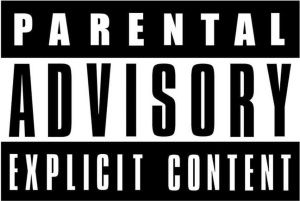
Image Credit http://2.bp.blogspot.com/-Ktk74eWFMyQ/UooA_dn4mtI/AAAAAAAABzg/iK2iGqMYnBA/s1600/866-01.jpg
Is This a Thing Now?
I was definitely curious to know more about whether or not the paper always prints swears in their entirety if they are part of actual quotes. Or was this a first because of how shocking it would be to hear/read those words from a US Presidential candidate? Thankfully, Eskin starts to answer some of my questions.
Eskin compared Trump’s quotes to those of Rakeyia Scott, who was quoted when talking about her husband after his deadly confrontation with Charlotte police. According to Eskin’s research, The New York Times originally posted quotes from Scott with their full expletives (mostly the “F” word) written out (“He better not be f*****g dead”). (Author’s note: I censored the “F” word here because I have a high school audience. The original article had the word printed in its entirety.)
However, not soon after the original publication of the article, The Times edited the article and censored the quotes (“He better not be [expletive] dead”). I’m guessing maybe they got some letters?
So, What’s the Difference?
So really, what is it about Scott’s expression of grief that is actually worse than Trump’s lewd use of the same word? Why did she get censored but not Trump?
As Eskin noted, these were individual editorial decisions in which the editors decided if they could and/or should keep the quotes in tact, warts and all. And they aren’t always consistent; that much is obvious. But why? Why is it ok for Trump to drop the F-bomb when talking about his failed attempt at seducing a married woman, but it’s not ok for a grieving wife to use the same word as a reaction to her anger and grief?
People, they’re messing with our minds!
Steven Pinker says that one reason people swear is to force our audience to think upsetting thoughts. When Trump says things like “I did try and f**k her” and “Grab them by the p***y,” he’s being crass. More than crass, actually. He’s being lewd and talking about women with not even one ounce of respect. And The Times wants to capture the full weight of that; they want to show just how creepy he is. It’s no secret that The Times endorses Hillary Clinton, so why should they bother protecting Trump by making his comments seem any less offensive than they are? Not only did the editors know that printing such shocking language would capture the attention of a sensationalism-craving audience, but they also get to portray the Republican candidate as a mysogynist pig, thus continuing to shape our political beliefs about the man. By being confronted with the actual, uncensored language that he used, we are also forced to let our minds run wild about what he may or may not have actually done. Trump might say “It’s just words, folks,” but we all know that words matter.
With Rakeyia Scott, it’s different. She is a black woman who lost her husband in a police shooting. By bleeping out the curse words that Scott used, the paper softens her language and takes away from the emotion she was feeling. If we go back to Pinker’s ideas, we can argue that just as being faced with harsh language makes us think harsh thoughts, it’s also true that being protected from strong words also protects us from the ideas or emotions those words convey.
Is The New York Times trying to protect its sensitive audience? Or are they just trying to be respectful of Scott’s heartbreak? Well, I’m not on the editorial board, so I really can’t say. But I do have to wonder if these seemingly small decisions are made as a way to shape our understanding of the world around us. As a wise (spider)man once said, with great power comes great responsibility, and I just hope it’s a responsibility that we all take very seriously indeed.
Word count: 892
Lincoln School Week 3 Documents
23 AugSyllabus documents
Year 2 IB Lang & Lit (seniors)
Homework due Fri/Mon (choose one article from the list below, read it, and come prepared to discuss it in your next class):
- Major League Soccer (MLS) Tries to Mute Vulgar Fans
-
My gold medal goes to Fu Yuanhui – for talking openly about her period
- For Stand-up Comedians, Shows on Campus are Often No Joke
- How One Stupid Tweet Blew Up Justine Sacco’s Life
Year 1 IB Lang & Lit SL (juniors)
Year 1 IB Lang & Lit HL (juniors)
Pictures of our STOP BAD FIT activity
Lincoln School Documents Week 2
16 AugIB Lang & Lit 2 (Seniors)
- Turnitin class enrollment codes:
- A34: 13194107 (password ibwow)
- B34: 13194120 (password ibwow)
- B78: 13194130 (password ibwow)
- Part 1 topics survey
- Research skills survey
- Reading response assignment sheet (will review in class on Aug 10/11)
- Sample reading response
- MLA workshop assignment sheet
IB Lang & Lit 1 (juniors) SL
- MLA workshop assignment sheet
- Hanging indent instructions
- Underline/Quotation Mark Guidelines
- Turnitin enrollment code:
- 13222048 (password ibwow)
- Language Map
Lincoln Documents Week 1
8 AugIB English Lang & Lit Year 2 (seniors)
- Daily agenda
- Syllabus
- Reading response assignment sheet (will review in class on Aug 10/11)
- Sample reading response
IB English Lang & Lit Year 1 SL (juniors)
IB English Lang & Lit Year 1 HL (juniors)
New country, new electronic space
4 AugHello! Thanks for stopping by. This year I have moved to a new school in a new country, and for the time being, I will be posting my homework updates on their homework platform. I hope to repurpose this blog and bring it back to life at some point in the future, but for now, I must say ¡hasta luego!

IB Homework till the end of the year
8 JunTues(B)/Wed(A), 9/10
- Due: IOCs (schedule is here)
- Due: last blog post/comments (6/10 11:59pm for all students). Remember to submit via the survey) (THIS IS OPTIONAL)
- In class: work on WT1
Thurs(B)/Fri(A), June 11/12
- Due: IOCs (schedule is here)
- In class: work on WT1
Mon(B)/Tues(A), June 15/16
- Due: IOCs (schedule is here)
- In class: work on WT1- due Tuesday night so it’s out of the way before exams.
Wed, Thurs, Fri, June 17, 18, 19
- Final exams – woo hoo! The IOC counts as your final, so you will not have a separate time scheduled for a traditional English exam.
Froshie homework for June!
29 MayMon(B), Tues(A), June 1/2
- Due: Finish note taking for all sources (2-3 articles from the list, plus support from Romeo and Juliet)
- In Class: We will be reviewing the criteria for your thesis and outline, and you will work on that in class
Wed(B)/Thurs(A), June 3/4
- Due: Completed thesis and outline
- In Class: Work on rough draft of the paper
Fri(B)/Mon(A), June 5/8
- Due: TBD
- In Class: Work on rough draft (should finish in class; if not, it’s for homework)
Tues(B)/Wed(A), June 9/10
- Due: Nothing (rough draft deadline extended due to my absences)
- In Class: TBD
Thurs(B)/Fri(A), June 11/12
- Due: Rough draft due
- In Class: Final exam review
Mon(B)/Tues(A), June 15/16
- Due: TBD
- In Class: R&J paper revisions
Wed, Thurs, Fri, June 17, 18, 19
- Final exams – woo hoo! Review sheet is here.
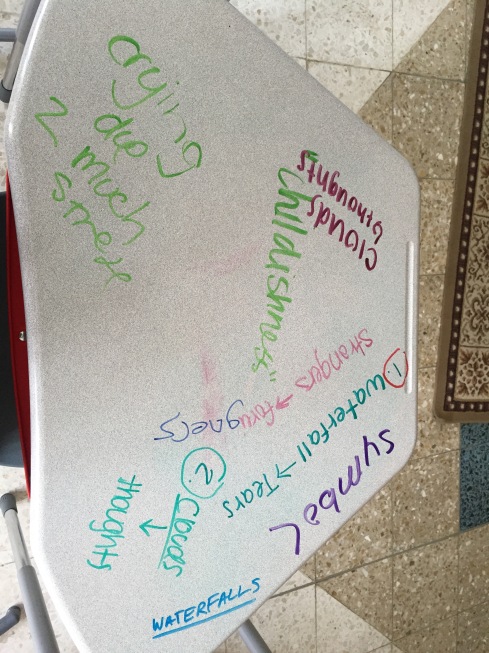
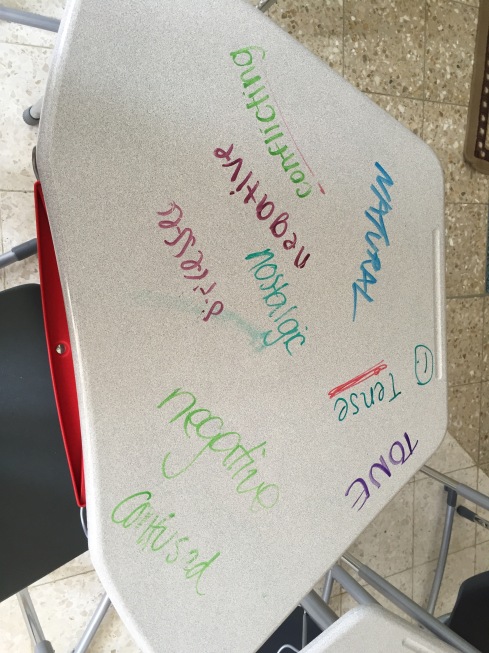
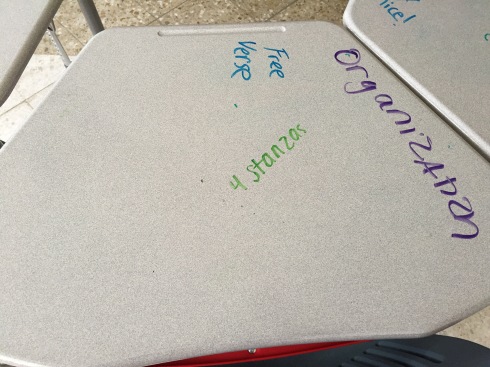
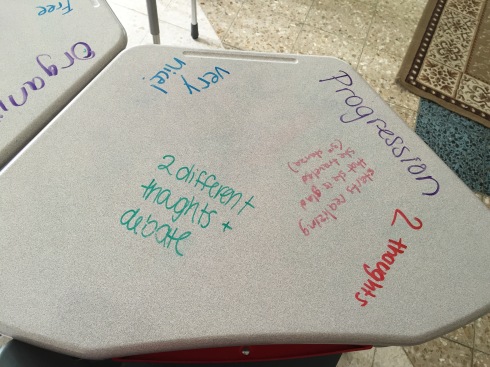
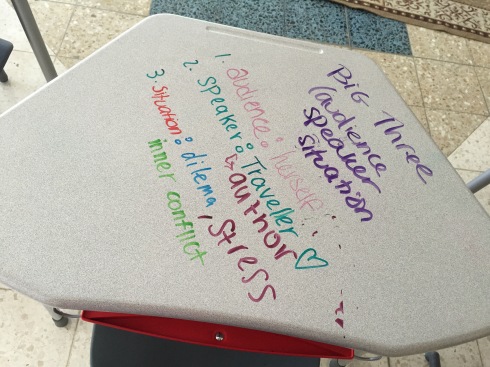
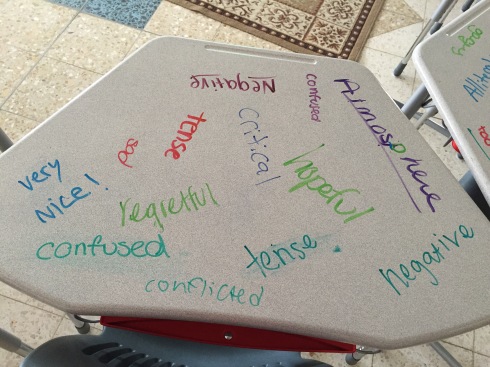
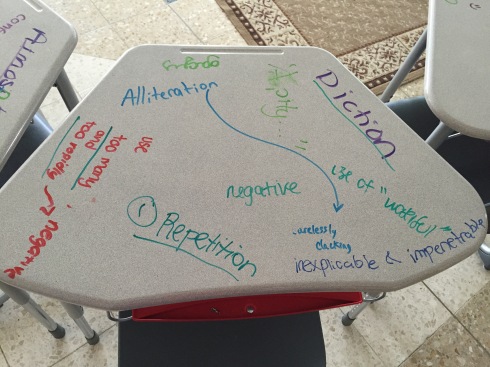
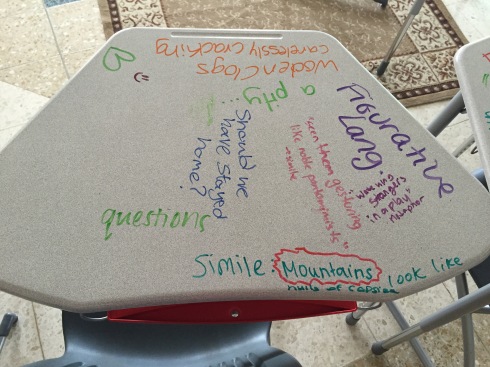
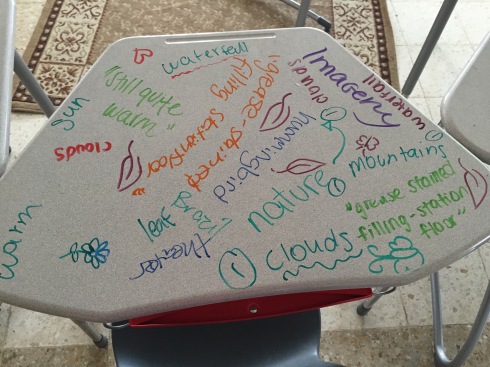
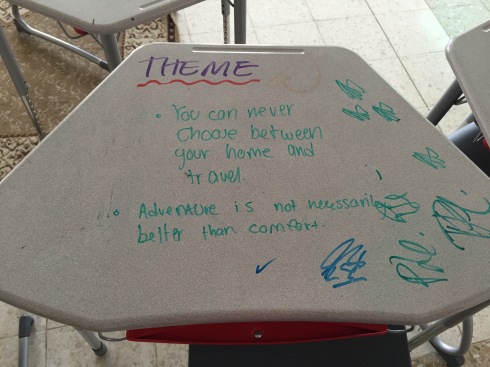
Recent Comments